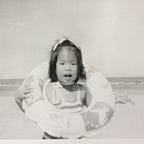You Look So Chinese!
Can a person look more, or less, Chinese? Apparently I can.
“You look so Chinese!”
Has anyone ever said that to you?
My mother occasionally said it to me, and the odd thing is, both she and my father were Chinese. So there’s nothing surprising about the fact that I look Chinese. But what about “so” Chinese? Can a person look more, or less, Chinese? Apparently I can.
When I wore gold-rimmed glasses that made my eyes appear smaller, I looked “so Chinese.” When my hair hung from my head in a certain way, I looked “so Chinese.” This was never a compliment. Mom was pointing out something, like when she’d tell me that a pair of pants made me look fat. Looking “so Chinese” was something that needed to be fixed. Why?
It’s important to see this in my mother’s context.
My mother arrived in the United States as a refugee in the 1950s. In her twenties, she’d lost her home and her family. She’d been accepted in an internship program at an U.S. hospital, but she was entirely dependent on the goodwill of others. It was crucial for her to integrate as quickly as possible. At the time, Chinese people only made up about 0.1% of the population. The standard stereotype for a Chinese was someone who lived in Chinatown; worked in a laundry or as a cook; couldn’t speak English; and didn’t eat American food, dress, or act American. When Mom saw Chinatown in New York, she was appalled by the squalor. The scene of poor and seemingly uneducated Chinese immigrants living on the outskirts of society shocked her. And I imagine it also frightened her.
When I was a child, The World of Suzie Wong was popular. I know that because men often made references to “little Suzie Wong” when they saw me. In the 1960 romantic film, an American played by William Holden moves to Hong Kong and falls in love with Suzie Wong, a character played by actress Nancy Kwan. I once asked who Suzie Wong was, and Mom said she was a bad woman. I was too young then to know about prostitutes. Two years after I was born, Hop Sing first appeared in the Bonanza television series. He was a smiling, obsequious house cook with a long black braid under a black Manchu cap and a strong accent that included the inability to pronounce the letter “R.”
We were the first Chinese family in our East Coast suburban town, and for most of the people we came into contact with, we were “The Chinese.” There was no way Mom was going to let anyone confuse us with an ignorant stereotype. We were a well-integrated, middle-class Chinese American family.
Mom’s strategy was to focus first on appearance. She made sure her children were always clean and fashionably dressed, like other American kids. We were Chinese, but the neighbors should see that we didn’t look “so Chinese.” Except for a few of our physical features, we looked typically American.
Recently, I discovered another situation where a Chinese immigrant placed great emphasis on the way her American-born children looked. In 1884 Mamie Tape, a young Chinese American girl, was denied access to a public school in San Francisco. Her parents fought back, and Mamie’s mother wrote a letter to the Board of Education. Over and over again, she insisted that her daughter was just as American as her Caucasian friends. An example she gave: “My children don’t dress like the other Chinese.” In other words, they didn’t look “so Chinese.”
I understood what my mother meant when she said I looked “so Chinese.” It was a warning that I stood out as something different, as not looking American. She saw her daughter as both Chinese and American, but Mom wanted to protect me from the Chinese stereotypes.
Unfortunately, her comment may have done more damage than good. It may actually have perpetuated in my mind the ugly cliché of the poorly educated and unintegrated Chinese person. From childhood onward, I’ve associated looking “so Chinese” with something negative. Not at all like looking “so French,” for example. That would be a compliment on my style of dressing.
If you’re from an immigrant family, I wonder if you’ve heard similar comments from your parents or relatives. Is it a typical immigrant phenomenon that we try to assimilate to the point of erasing inherent characteristics of our identity? And must this mean that we pass on a regret for the way we look to our children, and they to their children?
I know I’ve occasionally thought that one of my half-German children looked “so Chinese.” I know I’ve struggled with that thought and what I should do about it, but I don’t remember what I finally did. That may be irrelevant. The bigger question for me now is if I passed on this feeling to my children even without saying those words.
This essay first appeared in Seeing I’s. I’d love to hear your thoughts on it. Please post a comment or write to SeeingIsblog@gmail.com
